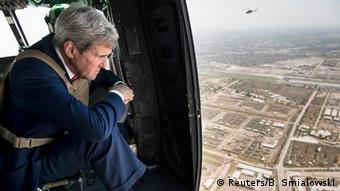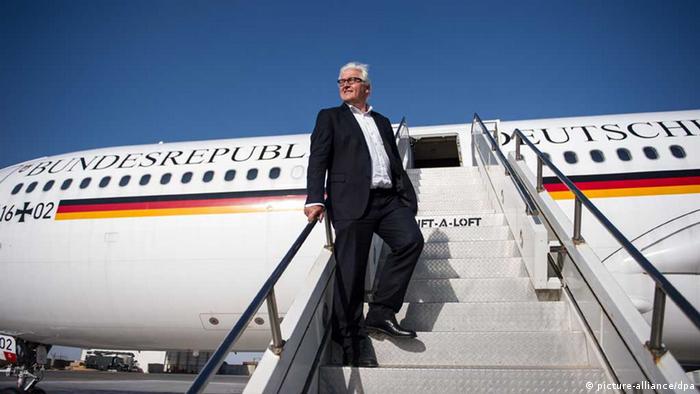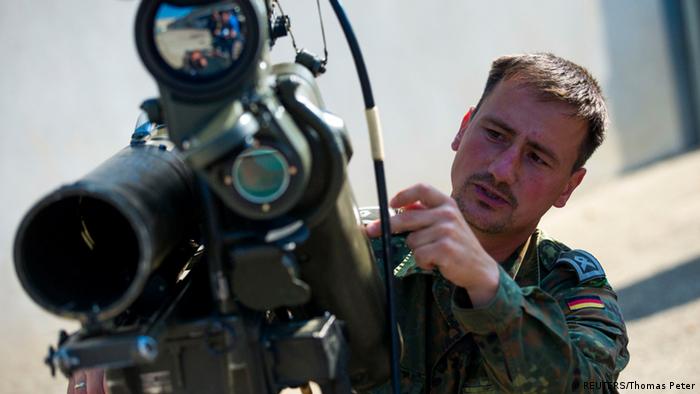Larger role for Germany in expanded 'IS' campaign?
The international campaign against "Islamic State" has widened to include multinational air campaigns and talks of boots on the ground. The message from Washington? Germany needs to do more.
He's in New York for fewer than 24 hours this round, and, accordingly, German Foreign Minister Frank Walter Steinmeier was highly active at the special UN Security Council meeting aimed at countering the threat of "Islamic State" (IS) in Iraq and Syria.
He called for more humanitarian aid for refugees of IS terror, actionable limits on the influx of foreign fighters, support for Iraq's new government, mentioned the UN envoy to Syria and did not forget to underscore Germany's arms deliveries to Kurdish militias.
"We have to act," he announced to the roundtable.
It's possible that the pithy statements from Germany's top diplomat, coming as they did just hours after France announced its first air strike against IS targets, were instinctive reactions to US critiques of German policy that have yet to be said in the open.
"There are increasingly larger expectations," says Michael Werz at the Center for American Progress. "When one talks to people here in Washington, then there's already an expectation that the Germans, ideally, will participate in air strikes in the long term." That, however, is not enough."
Great expectations
If one is to believe Werz, who's well connected to the Obama administration, the Americans expect Germans to substantially support the Syrian opposition when it comes to training and equipping them with weapons and, ultimately, to contribute to bringing the Iraqi army to a point where it can successfully resist [IS]. That goes far beyond weapons deliveries to Kurdish militia.
At a press conference shortly before his speech at the Security Council, Steinmeier asserted - in response to a DW question - that he was not aware of any additional expectations from the Americans. "It's the opposite - that the things we've delivered are not only being recognized, but I think in terms of magnitude, it's still above that which other countries have decided upon. In that respect, I've heard of no further expectations of us," he said.
"It's interesting to observe that the discussion in Germany has been conducted completely differently than in the US," says Michael Werz. "Germany's domestic perspective sometimes has very little to do with how the discussion's are conducted on the outside. What in Germany appears to be a big step is, when you look at the scale of the crisis and the geographical proximity to Germany, a small step."
'Make good on its promises'
For William Drozdiak, a previous Berlin bureau chief for the Washington Post newspaper and current president of the Atlantic Council on Germany think tank, Americans can't be satisfied with German weapons deliveries to Kurds - even if it means the German government giving up its long-imposed restraint on such deliveries.
It's very likely that, in the US, the debate will continue as to whether the US will deploy special forces in Iraq. The outright dissent between President Obama and military officials at the Pentagon - first reported on by the Washington Post, then by other American media - is far from resolved. While Obama continues to rule out the option of American boots on the ground, General Dempsey, America's top soldier, pointedly keeps it open, arguing that Americans would hope and expect Germany to join the US, Great Britain and France in on-the-ground operations. Drozdiak also points to recent speeches by German President Gauck and Foreign Minister Steinmeier in which they argued for a more assertive German foreign policy.
Through stronger engagement in current, pressing crises, Germany could "make good on its promises and, in the future, take on more responsibility."
A comprehensive strategy

America's top diplomat, John Kerry, has pulled together an international coalition to fight Islamic extremists in Iraq
American frustrations are rooted, says Werz, in 40 years of history.
"From an American perspective, Germans have been under America's nuclear umbrella, which was financed through taxes." As a result, he says, they had the space they needed to arrange their "economic miracle" and become an export superpower. Only in Germany's strategic and military thinking has the country not yet matured.
Werz sees good reason to do so."You have to recall that, up to the present day, German and European oil interests in the Gulf have not been secured by European ships, but by American ones. Now there's the expectation that Europe will become more self-reliant."
Germans, however, tend to argue that military action is not everything. And in New York, Steinmeier chimed in. "We will of course engage in further policy efforts, since, in the end, it will of course not only be about air attacks and air support, and not only about weapons deliveries."
It's about a comprehensive military strategy, he said.
German wishful thinking?
Diplomatically, Germany could be beneficial as a line to Iran. The country holds a key position in the fight against IS. The Iranian-backed Shiite militia in Iraq turned out, unlike the official Iraqi army, to be robust in its fight against IS.
"I think German dialogue with Iran is important," Drozdiak says. "The Germans have a very active embassy in Tehran. I think, if we want to overcome this crisis, there must be some sort of cooperation with Iran." He also pointed out that Iran's foreign minister will be in New York next week for a UN General Assembly.
With all the difficulties the West currently has in its talks with Iran over its nuclear program - "And I know what I'm talking about," Drozdiak says - Foreign Minister Steinmeier is "nevertheless of the opinion that, in the attempt to master the threat from IS, every one of Iraq's neighbors should be integrated into the international efforts.
Here, says Werz, there's dissonance with the Americans, who consider this a form of "German wishful thinking."
"The Iranian leadership has just made very clear that there is no alternative from Iran's perspective to work together with the United States and other European states."
With that in mind, countries shouldn't awaken false hopes, he says, but should instead concentrate on other European states on what the core of the Western alliance, namely France, England, Germany and the Untied states, can do together to stabilize Iraq and end the crisis in Syria. dw de



No comments:
Post a Comment